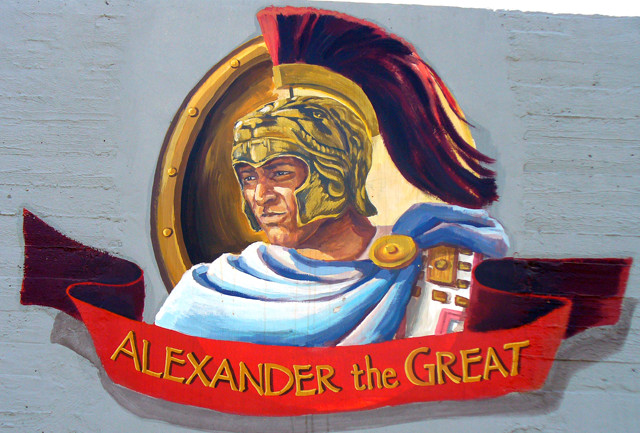
by Ward Chesworth Tuesday, May 1, 2018

Credit: Yuval Y CC BY-SA 2.0
by Ward Chesworth
“With great power comes great responsibility.” — Various (including “Amazing Fantasy #15,” the comic in which Spider-Man was first introduced)
As near as I can make out, William Bonney was a psychopath. Before Pat Garrett shot him dead in 1881, Bonney was known to have killed at least eight men (he claimed 21), all before he reached age 22. He’s known to history as Billy the Kid, and that label “Kid” softens our view of him somewhat. Kids are the delightful young of the tribe — playful and sometimes mischievous, but psychopaths? “Never,” you say, thinking of a well-loved kid of your own, perhaps. That’s why Billy’s been portrayed in movies and on TV as basically loveable but a bit mixed up.
He brings to mind another young overachiever, Alexander III of Macedon. This superhero of history, universally known as Alexander the Great, was intent upon getting into real estate in a big way by conquering a bigger chunk of the planet than anybody before him. He’s called “Great” for that reason, but that sobriquet has been handed out too readily at times, especially to royals. You would think that it would be reserved for the true heroes of humanity: for the inventive plumber perhaps, who brought us hot baths and flush toilets, or for the genius who first put the bubbles into beer. Anyway, after two and a half thousand years, I think Alexander needs rebranding. We could take a leaf from young Billy Bonney’s book and try “Sandy the Kid,” but up on Olympus — where he’s made his home since his followers made him a god — he likely wouldn’t be pleased and might send a few thunderbolts our way.
Let’s review Alexander’s biography. As a boy, he had the best education possible, with none other than Aristotle as his tutor. The small kingdom of Macedonia that Alexander, at age 20, inherited from his dad, King Philip, was expanded a hundred-fold by the time he died at 32. Everywhere his military exploits took him, he stamped his mark on the landscape by building cities, which he called Alexandria, until they dotted the landscape like so many Trump Towers. He could no doubt claim that, at his inauguration as King of Kings, the crowd was bigger than it had been for Darius and Xerxes, earlier holders of the office, so Alexander the Great is certainly a credible title.
That is, until we consider the dark side. In his march of conquest, he killed thousands of people, razed myriad cities and trampled cultures into dust. Disturbing stories of moral turpitude persist, and historians point to booze as the fundamental problem. Alexander spent most of his downtime listening to the flattery of sycophants while guzzling wine by the amphora. (It’s a pity the Scots were a little tardy in exporting golf or that might have taken his mind off the bottle.) Indeed, he reportedly died in a drunken orgy in Babylon, rather than from fever as official history records, and in another story he is said to have committed murder to win an argument. The homicide was in what is today Iraq, arguably the site of the richest reservoir of crude oil in the world, and even in the 4th century BC known for seepages of a tarry hydrocarbon called naphtha. The drink-fueled dispute arose over whether a human coated with naphtha could be set alight. Alexander chose a young slave, covered him with tar, and set him aflame.
I’m sure that, nowadays, Alexander would have argued that the slave died a willing martyr to his Emperor’s commitment to furthering the science of human combustion. Spider-Man might have branded him Alexander the Irresponsible, though I would prefer Alexander the Appalling. But give a ruler a bad name and a whole culture is tarred and feathered. Think Vlad the Impaler and Transylvania.
Let’s reject all that history — it’s fake news anyway — and concentrate on his years of innocence. Hearsay and gossip both authenticate the following story of Alexander as a kid: When he was 12, Alexander went with King Philip to buy a horse. The strongest one at the sale was a massive animal called Bucephalus, but the horse was so wild no one could ride him. “Let me try, Dad,” said Alexander, and before the King could say “Nay!” the prince was popping the equine equivalent of a wheelie right ‘round the show ring. “He’s a genius,” the accompanying sycophants acclaimed, so Philip bought Bucephalus for his son, and from that day boy and horse used to hang together, inseparable companions, down at the Royal Stables.
So, I suggest that an appropriate new name for the Great Conqueror is Alexander the Stable Genius. Why, it’s as up-to-date as today’s headlines.
© 2008-2021. All rights reserved. Any copying, redistribution or retransmission of any of the contents of this service without the expressed written permission of the American Geosciences Institute is expressly prohibited. Click here for all copyright requests.